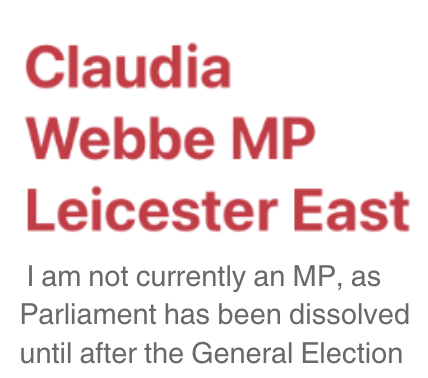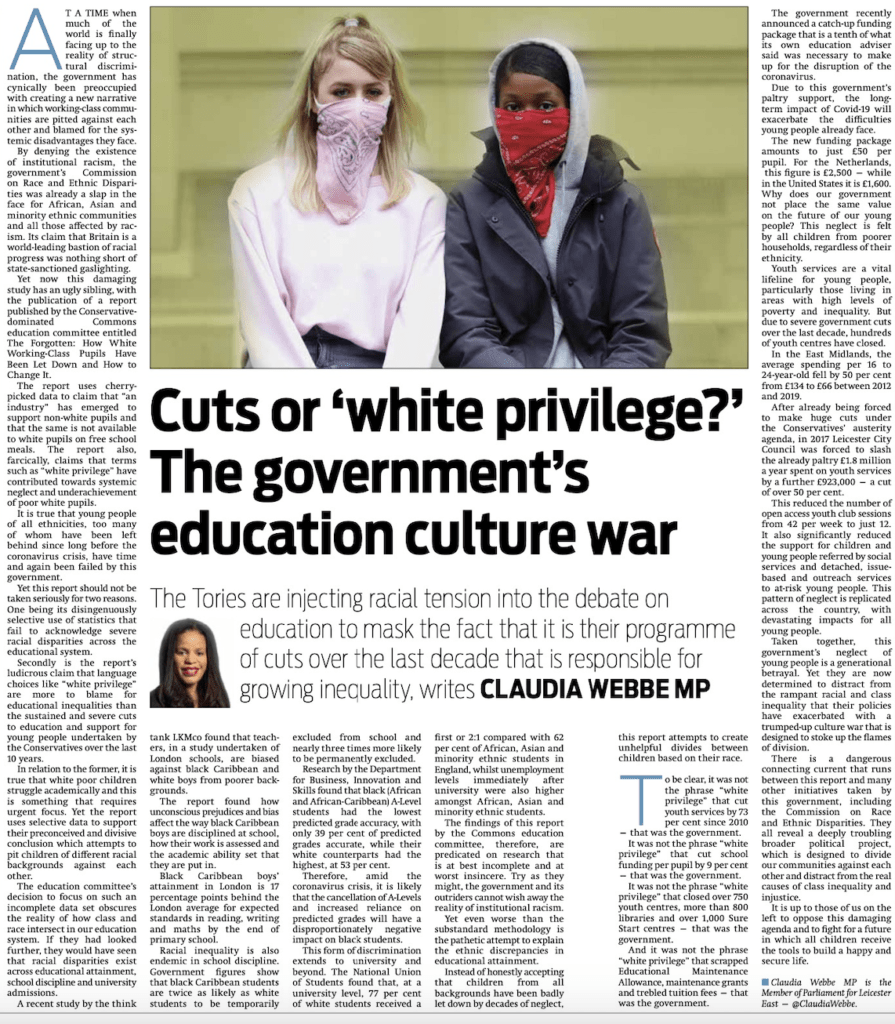Cuts or ‘white privilege?’ The government’s education culture war
By Claudia Webbe MP
The Tories are hell-bent on injecting racial tension into the debate on educational attainment to mask the obvious fact that it is their programme of cuts over the last decade that is responsible for growing inequality, writes CLAUDIA WEBBE MP
AT A TIME when much of the world is finally facing up to the reality of structural discrimination, the government has cynically been preoccupied with creating a new narrative in which working-class communities are pitted against each other and blamed for the systemic disadvantages they face.
By denying the existence of institutional racism, the government’s Commission on Race and Ethnic Disparities was already a slap in the face for African, Asian and minority ethnic communities and all those affected by racism. Its claim that Britain is a world-leading bastion of racial progress was nothing short of state-sanctioned gaslighting.
Yet now this damaging study has an ugly sibling, with the publication of a report published by the Conservative-dominated Commons education committee entitled The Forgotten: How White Working-Class Pupils Have Been Let Down and How to Change It.
The report uses cherry-picked data to claim that “an industry” has emerged to support non-white pupils and that the same is not available to white pupils on free school meals. The report also, farcically, claims that terms such as “white privilege” have contributed towards systemic neglect and underachievement of poor white pupils.
It is true that young people of all ethnicities, too many of whom have been left behind since long before the coronavirus crisis, have time and again been failed by this government.
Yet this report should not be taken seriously for two reasons. One being its disingenuously selective use of statistics that fail to acknowledge severe racial disparities across the educational system.
Secondly is the report’s ludicrous claim that language choices like “white privilege” are more to blame for educational inequalities than the sustained and severe cuts to education and support for young people undertaken by the Conservatives over the last 10 years.
In relation to the former, it is true that white poor children struggle academically and this is something that requires urgent focus. Yet the report uses selective data to support their preconceived and divisive conclusion which attempts to pit children of different racial backgrounds against each other.
The education committee’s decision to focus on such an incomplete data set obscures the reality of how class and race intersect in our education system. If they had looked further, they would have seen that racial disparities exist across educational attainment, school discipline and university admissions.
A recent study by the think tank LKMco found that teachers, in a study undertaken of London schools, are biased against black Caribbean and white boys from poorer backgrounds.
The report found how unconscious prejudices and bias affect the way black Caribbean boys are disciplined at school, how their work is assessed and the academic ability set that they are put in.
Black Caribbean boys’ attainment in London is 17 percentage points behind the London average for expected standards in reading, writing and maths by the end of primary school.
Racial inequality is also endemic in school discipline. Government figures show that black Caribbean students are twice as likely as white students to be temporarily excluded from school and nearly three times more likely to be permanently excluded.
Research by the Department for Business, Innovation and Skills found that black (African and African-Caribbean) A-Level students had the lowest predicted grade accuracy, with only 39 per cent of predicted grades accurate, while their white counterparts had the highest, at 53 per cent.
Therefore, amid the coronavirus crisis, it is likely that the cancellation of A-Levels and increased reliance on predicted grades will have a disproportionately negative impact on black students.
This form of discrimination extends to university and beyond. The National Union of Students found that, at a university level, 77 per cent of white students received a first or 2:1 compared with 62 per cent of African, Asian and minority ethnic students in England, whilst unemployment levels immediately after university were also higher amongst African, Asian and minority ethnic students.
The findings of this report by the Commons education committee, therefore, are predicated on research that is at best incomplete and at worst insincere. Try as they might, the government and its outriders cannot wish away the reality of institutional racism.
Yet even worse than the substandard methodology is the pathetic attempt to explain the ethnic discrepancies in educational attainment.
Instead of honestly accepting that children from all backgrounds have been badly let down by decades of neglect, this report attempts to create unhelpful divides between children based on their race.
To be clear, it was not the phrase “white privilege” that cut youth services by 73 per cent since 2010 — that was the government.
It was not the phrase “white privilege” that cut school funding per pupil by 9 per cent — that was the government.
It was not the phrase “white privilege” that closed over 750 youth centres, more than 800 libraries and over 1,000 Sure Start centres — that was the government.
And it was not the phrase “white privilege” that scrapped Educational Maintenance Allowance, maintenance grants and trebled tuition fees — that was the government.
The government recently announced a catch-up funding package that is a tenth of what its own education adviser said was necessary to make up for the disruption of the coronavirus.
Due to this government’s paltry support, the long-term impact of Covid-19 will exacerbate the difficulties young people already face.
The new funding package amounts to just £50 per pupil. For the Netherlands, this figure is £2,500 — while in the United States it is £1,600. Why does our government not place the same value on the future of our young people? This neglect is felt by all children from poorer households, regardless of their ethnicity.
Youth services are a vital lifeline for young people, particularly those living in areas with high levels of poverty and inequality. But due to severe government cuts over the last decade, hundreds of youth centres have closed.
In the East Midlands, the average spending per 16 to 24-year-old fell by 50 per cent from £134 to £66 between 2012 and 2019.
After already being forced to make huge cuts under the Conservatives’ austerity agenda, in 2017 Leicester City Council was forced to slash the already paltry £1.8 million a year spent on youth services by a further £923,000 — a cut of over 50 per cent.
This reduced the number of open access youth club sessions from 42 per week to just 12. It also significantly reduced the support for children and young people referred by social services and detached, issue-based and outreach services to at-risk young people. This pattern of neglect is replicated across the country, with devastating impacts for all young people.
Taken together, this government’s neglect of young people is a generational betrayal. Yet they are now determined to distract from the rampant racial and class inequality that their policies have exacerbated with a trumped-up culture war that is designed to stoke up the flames of division.
There is a dangerous connecting current that runs between this report and many other initiatives taken by this government, including the Commission on Race and Ethnic Disparities. They all reveal a deeply troubling broader political project, which is designed to divide our communities against each other and distract from the real causes of class inequality and injustice.
It is up to those of us on the left to oppose this damaging agenda and to fight for a future in which all children receive the tools to build a happy and secure life.
Claudia Webbe MP is the member of Parliament for Leicester East. You can follow her at www.facebook.com/claudiaforLE and twitter.com/ClaudiaWebbe



